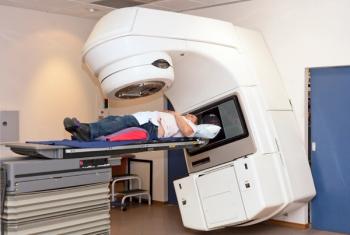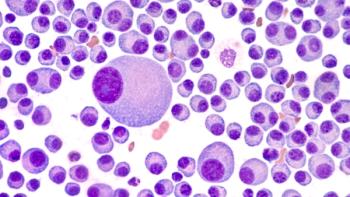
CancerNetwork®’s podcast dissected a review article published in the journal ONCOLOGY® on the 21-gene recurrence score in patients with node-positive breast cancer.

Your AI-Trained Oncology Knowledge Connection!


CancerNetwork®’s podcast dissected a review article published in the journal ONCOLOGY® on the 21-gene recurrence score in patients with node-positive breast cancer.

Building off of findings from the phase 3 NOVA study, this study revealed that an individualized starting dose of niraparib based on baseline bodyweight and platelet count could improve the tolerability of niraparib without affecting treatment outcomes.

Guidelines released by the Society for Immunotherapy of Cancer are intended to provide clinicians with the most current thinking on how experts can integrate immunotherapy into the treatment of patients with lymphoma.

Patients with EGFR-positive non–small cell lung cancer who received treatment with osimertinib following surgery versus placebo experienced no clinically meaningful differences in health-related quality of life, according to results of a pivotal phase 3 trial.

A recent trial investigating the potential for stereotactic ablative body radiotherapy to treat patients with extracranial oligometastatic cancer found improved survival and a manageable safety profile.

Data published in Cancer Discovery determined Black patients with acute myeloid leukemia have considerably worse overall survival rates than White patients with the same disease.

The trial demonstrated that combination treatment with bemcentinib and pembrolizumab was well tolerated and clinically active in patients with checkpoint inhibitor (CPI)–naïve and CPI–refractory composite AXL (cAXL)–positive non–small cell lung cancer.

More cases of metastatic prostate cancer may be linked with a reduction in prostate-specific antigen screening, experts say.

Findings from the phase 3 CONDOR trial support the use of the PSMA PET imaging agent 18F-DCFPyL as the FDA prepares to make a decision on a new drug application regarding its use.

Investigational agent belzutifan plus cabozantinib was able to control tumor growth in most patients with advanced clear cell renal cell carcinoma in a phase 2 trial.

A phase 2 SWOG trial comparing multiple therapies versus sunitinib for papillary renal cell carcinoma revealed superior activity of cabozantinib in this setting.

Better progression-free survival, as well as improved responses, were seen when lenvatinib was combined with either pembrolizumab or everolimus versus standard-of-care sunitinib in the treatment of patients with advanced renal cell carcinoma receiving therapy in the frontline setting.

In patients with cisplatin-ineligible, locally advanced or metastatic urothelial cancer who received prior PD-1/PD-L1 inhibitors, enfortumab vedotin induced the highest response rates seen with any regimen in this setting.

In non-muscle invasive bladder cancer carcinoma in-situ that is not responsive to BCG alone, the addition of N-803 leads to efficacy while maintaining safety.

Patients with metastatic renal cell carcinoma and brain metastases showed significant intracranial and extracranial responses with cabozantinib use.

Compared with androgen-deprivation therapy alone, patients with metastatic castration-sensitive prostate cancer had better outcomes when apalutamide was added to systemic therapy.

Adjuvant therapy with nivolumab was superior to placebo for improving disease-free survival in patients with muscle-invasive urothelial carcinoma.

Recently reported data continue to support the use of enfortumab vedotin in patients with advanced urothelial carcinoma who had previously been treated with chemotherapy and immunotherapy.

Compared against sunitinib, nivolumab plus cabozantinib induced better outcomes in patients with advanced renal cell carcinoma and these results were seen in patients with and without sarcomatoid features.

The approval of trilaciclib was based on results from a pooled analysis of intent-to-treat datasets from 3 studies of patients with extensive-stage small cell lung cancer in which patients received standard chemotherapy plus either trilaciclib or placebo.

The potential to identify occult prostate cancer and accurately characterize disease burden was observed with the novel prostate specific membrane antigen (PSMA)–targeted radiopharmaceutical for PET imaging technique.

Pal discussed findings from the SWOG 1500 trial investigating sunitinib versus either cabozantinib, crizotinib, or savolitinib to treat patients with metastatic papillary RCC.

Using the single-agent atezolizumab (Tecentriq) plus chemotherapy versus chemotherapy alone to treat patients in the front-line setting with cisplatin-ineligible IC2/3 advanced or metastatic urothelial carcinoma (mUC) revealed additional clinical evidence.

As third- or fourth-line therapy for patients with metastatic RCC, tivozanib hydrochloride demonstrated a statistically significant increased quality-adjusted time without symptoms of disease and toxicity compared with sorafenib.

Darolutamide still has a favorable safety profile with prolonged treatment among patients with nonmetastatic castration-resistant prostate cancer.

First-line treatment with nivolumab plus cabozantinib demonstrated health-related quality of life benefits in patients with advanced renal cell carcinoma.

“Based on these findings, patients who received lenvatinib 18 mg starting dose had better quality of life and less severe symptoms than those who received lenvatinib 14 mg starting dose,” said Cristiane Decat Bergerot, PhD, MS, BS.

For patients with chemotherapy-naïve metastatic castration-resistant prostate cancer receiving androgen deprivation therapy, abiraterone acetate and prednisone plus the addition of apalutamide reduced the risk of radiographic progression or death by 30%.

CancerNetwork® spoke with the CEO of Nanobiotix and an assistant professor of Oncology at John Hopkins Medicine to learn more regarding the potential of the radio enhancer NBTXR3.

Avelumab plus best supportive care as frontline maintenance therapy produced a favorable benefit-risk balance for Japanese patients with advanced urothelial cancer who did not progress on first-line chemotherapy.